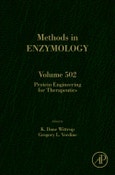This volume of Methods in Enzymology looks at Protein Engineering for Therapeutics. The chapters provide an invaluable resource for academics, researchers and students alike. With an international board of authors, this volume is split into sections that cover subjects such as Antibodies, Protein conjugates, Peptides, Enzymes and Scaffolds
Please Note: This is an On Demand product, delivery may take up to 11 working days after payment has been received.
Table of Contents
- Simplified Synthetic Antibody Libraries
- Generation of Dual Variable Domain Immunoglobulin Molecules for Dual-specific Targeting
- Discovery of internalizing antibodies to tumor antigens from phage libraries
- Optimizing properties of anti-receptor antibodies using kinetic computational models and experiments
- Cell-specific siRNA delivery by peptides and antibodies
- Conjugation of Anticancer Drugs Through Endogenous Monoclonal Antibody Cysteine Residues
- Building and characterizing antibody-targeted lipidic nanotherapeutics
- Cell-Targeting Fusion Constructs Containing Recombinant Gelonin
- Stapled Peptides for Intracellular Drug Targets
- Mapping of vascular zip codes by phage display
- Engineering cyclic peptide toxins
- Peptide Discovery using Bacterial Display and Flow Cytometry
- Oral enzyme therapy for celiac sprue
- Rational Design and Evaluation of Mammalian Ribonuclease Cytotoxins
- Engineering Reduced-Immunogenicity Enzymes for Amino Acid Depletion Therapy in Cancer
- Designed Ankyrin Repeat Proteins (DARPins): From research to therapy
- Target-binding proteins based on the tenth human fibronectin type III domain (10Fn3)
- Anticalins: small engineered binding proteins based on the lipocalin scaffold
- T Cell Receptor Engineering
- Engineering Knottins as Novel Binding Agents
- Re-Engineering Biopharmaceuticals for Targeted Delivery Across the Blood-Brain Barrier
- Practical Theoretic Guidance for the Design of Tumor Targeting Agents
- Fusions of elastin-like polypeptides to pharmaceutical proteins
- Engineering and Identifying Supercharged Proteins for Macromolecule Delivery into Mammalian Cells







